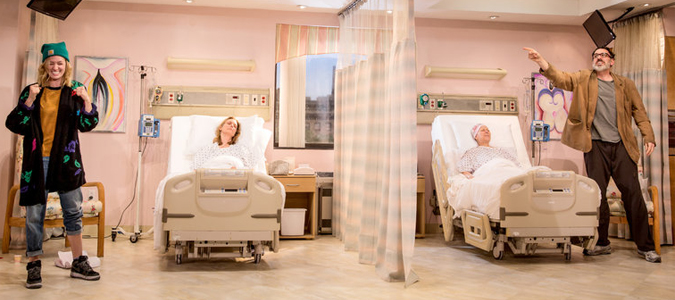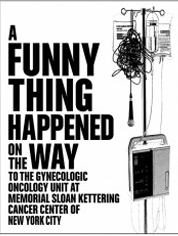

A Funny Thing Happened on the Way to the Gynecologic Oncology Unit
Opening Night: June 7, 2016
Closing: July 3, 2016
Theater: Lucille Lortel Theatre
A foul-mouthed twenty-something comedian and a middle-aged man embroiled in a nasty divorce are brought together unexpectedly when their cancer-stricken mothers become roommates in the hospital. Together, this unlikely duo must negotiate some of life’s biggest challenges… while making some of the world’s most inappropriate jokes. Can these two very lost people learn to laugh through their pain and lean on each other when all they really want to do is run away?
BUY TICKETSREAD THE REVIEWS:
June 7, 2016
There’s a raw spot — one of the tenderest places on the continent of human emotions — that exists between laughter and pain. Make that between laughter and everything that feeds pain: rage, hatred, desperation, hopelessness, fear, even physical disease. Such is the location of Halley Feiffer’s “A Funny Thing Happened on the Way to the Gynecologic Oncology Unit at Memorial Sloan Kettering Cancer Center of New York City,” a play that is as deeply felt as its name is long. To be literal, its setting is a sickeningly pink double room in the hospital of its title. But as anyone who’s spent much time in similar rooms knows, antechambers to death are incubators for those guffaws that it’s hard to distinguish from sobs, places where you find yourself fighting a close battle with the urge to giggle madly. To give in to such an impulse, in such a context, would be very, very inappropriate. Or would it? “Funny Thing,” which opened on Tuesday night at the Lucille Lortel Theater, makes a convincing case that hard laughter is an absolutely appropriate response, if not a socially sanctioned one, to those moments when life seems like too bad a joke not to respond otherwise. And if you feel that way all the time, as does the young stand-up comedian played with uncompromising obnoxiousness by Beth Behrs, well, I pity you. But I sure know where you’re coming from, especially after seeing this gorgeously acted MCC Theater production, directed by Trip Cullman. Ms. Feiffer, the talented young playwright (and actress) whose earlier work includes the recent downtown hit “I’m Gonna Pray for You So Hard,” is mining familiar territory. We know what Freud said about humor and hostility, and what cultural pundits have been saying about anger and comedy forever. Wisecracking in the shadow of death has been the basis for entire club acts (Tig Notaro) and amiably morbid movies (Judd Apatow’s “Funny People”). But Ms. Feiffer — whose father is the cartoonist laureate of urban neuroses, Jules Feiffer — has her own winsomely vicious approach to the subject, one that makes us feel close kin to the awkward, feel-bad clowns who dominate open-mike nights. And you start to think that the reasons comedians talk so often before an audience about the fear of dying have far wider implications than you imagined. On the basis of the jokes she’s trying out on a captive (and possibly comatose) audience in the opening scene of “Funny Thing,” Karla (Ms. Behrs) has been dying all her life. “I’ve been single for so long, I’ve started having sexual fantasies about my vibrator,” she says in the play’s opening line, one she will keep amending endlessly. Hold for your laugh, Karla. Except it never arrives. Karla’s audience is her mom, Marcie (Lisa Emery), who’s in the hospital bed recovering from surgery for ovarian cancer. (The set designer Lauren Helpern has provided an unsparingly exact facsimile of hospital décor, starting with its watery Pepto-Bismol walls.) Marcie’s in no condition to do anything but snore right now. Anyway, it turns out that this nonresponse to her daughter’s wit is pretty much the same when Marcie’s awake. Then someone else soon enters the room who, from the other side of a flimsy dividing curtain, can hear Karla’s raunchy musings on masturbation, and they do not sit well with him: Don (Erik Lochtefeld), a lanky, middle-aged millionaire who dresses like a homeless person and who’s there to visit his mother, the vegetative-seeming Geena (Jacqueline Sydney). And there you have the entire cast of characters, and the setup for an extended joke in which death is the inevitable punch line. In fact, it’s the sentence “She’s dead,” uttered in a strangulated voice by the still-sleeping Marcie, that allows Don and Karla to start bonding, after meeting in a barrage of noisy insults that is as classically and irritatingly New York as a stalled subway car. By now, you may think you know where the plot is heading, and your surmises are probably not wrong. For its intermissionless 85 minutes, “Funny Thing” abides by the rom-com rules that a couple who meet antagonistically have to be attracted to each other, and that any heroine who is so aggressively defensive has a tortured back story, preferably involving a mirror-image parent. But to render “Funny Thing” in synopsis doesn’t do justice to Ms. Feiffer’s exposed nerve of a script, or to the open-wound performances, which Mr. Cullman has steered as close to festering as audiences’ stomachs allow. Ms. Behrs, best known as the exiled society princess on television’s “2 Broke Girls,” makes a brave and very effective Manhattan stage debut. Her Karla is one of the New York archetypes you would least like to be trapped in an elevator with: a showboating narcissist who draws you in to push you away, while operating on the conversational principle that there’s no such thing as too much information. But Ms. Behrs finds the frightened passivity within Karla’s aggression, and she keeps us on her character’s side without even asking us to like her. Ms. Sydney is saddled with what might be called a prop part, but in Geena’s fleeting moments of consciousness, she delivers. Ms. Emery is, as always, a knockout, creating a portrait of a monster mom that also reminds you that no human being is truly a monster. And Mr. Lochtefeld is so appealingly heartbroken as the gangly, life-mangled Don that you’ll wonder where he’s been all your life. Ms. Feiffer’s script needs these performances. It’s heavy on monologues of self-revelation that, in the wrong hands, could freeze the show’s momentum. But this spare but choice ensemble listens as well as it talks, and every splenetic speech, no matter how self-contained, still feels like part of a vital dialogue. Besides, these people are all New Yorkers. Monologue is their native tongue. And that sentence sets me up quite nicely to describe what has to be the most sensational — and funniest — sex scene on a New York stage these days. But, hey, I know when to stop. That Ms. Feiffer’s characters do not is what makes them so painfully irresistible.
READ THE REVIEW


















